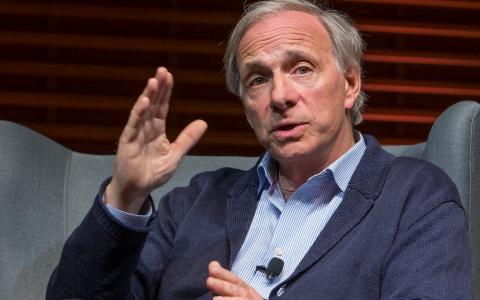
Breathing in and out helped Ray Dalio ensure that the money almost always stayed in. The founder of the world’s largest hedge fund, Bridgewater Associates, with a net worth of about $17 billion, has practised transcendental meditation (TM) for several years. It enabled the American to recover from a disastrous bet and prosper in a challenging world - a world which he says is going to get faster in the next five years.
“The world is going to change at an incredibly fast pace,” Dalio, 71, told CoinDesk, the opinion and news portal specialising in digital currencies, during its 2021 Consensus conference. “Whoever wins the technology race, wins it all, economically, and militarily. That’s what the next five years looks like.”
Dalio also weighed in on cryptocurrency, currently a polarising subject in finance. “I have some Bitcoin,” he said.
But Dalio warned that Bitcoin’s success could be its impediment.
“Bitcoin’s greatest risk is its success,” he said. “One of the great things, I think, as a worry is the government having the capacity to control ... bitcoin, or the digital currencies. They know where they are, and they know what’s going on.
“The more we create savings in (Bitcoin), the more you might say, ‘I’d rather have bitcoin than the bond.’ Personally, I’d rather have bitcoin than a bond. And then the more that happens, then it goes into bitcoin and it doesn’t go into credit, then (governments) lose control of that.”
Dalio had expressed concern about the risk of government regulation earlier. In January, he wrote on the Bridgewater website, “If it’s (bitcoin) successful, the government will try to kill it and they have a lot of power to succeed.”
Dalio showed early aptitude for the financial world. According to CNBC Make It, he bought his first share at age 12 for less than $5, which he earned as a golf caddy.
Professional success came early too. In his 20s, soon after getting an MBA from Harvard, Dalio launched Bridgewater from his New York apartment. But seven years on, he lost almost everything after a bad investment. He borrowed some money from his father to tide over the phase, and started meditation.
“I had learned transcendental meditation,” Dalio said in another interview. “I used it to reflect on mistakes and to clear my mind. When the pain passes, don’t just go forward, reflect, because that’s where your progress is.”
Dalio took up transcendental meditation after the Beatles discovered it in India in 1968. While breathing is a part of the technique, its bigger focus is on reaching a calm mental state, beyond thinking, by closing the eyes and repeating a mantra in silence.
TM helped Dalio temper his aggression. And it changed his attitude from thinking he was always right to instead asking himself, “How do I know I’m right?”
“I saw clearly that the best way to answer this question is by finding other independent thinkers who are on the same mission as me and who see things differently from me,” Dalio wrote in his book. Such an approach helped him and his colleagues, and that in turn benefitted his company.
This article originally appeared on money control.



